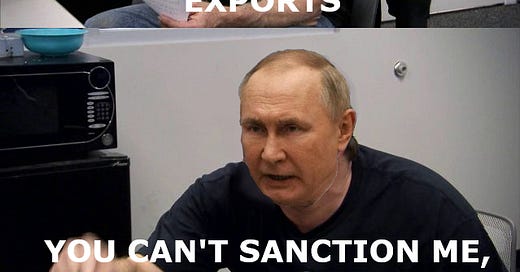In classic meme fashion the US and Russia are deadlocked in a tit-for-tat battle over sanctions. Putin warned earlier this week that sanctions are a de-facto act of war. In the face of this, today the Biden administration upped the rhetoric. In an announcement this morning, Biden stated that there will be a ban on Russian oil and other energy imports. The UK is following suit with their own ban. They will phase out Russian oil by year-end. Their proclamation does not include other energy imports such as natural gas or coal. This is an escalation with disastrous consequences, the most concerning is the effect on the dollar.
However, while the US is ratcheting up the rhetoric, Ukraine is looking to tone it down. In an interview with ABC News last night, President Zelensky said,
"I’m talking about security guarantees. I think items regarding temporarily occupied territories and unrecognized republics that have not been recognized by anyone but Russia, these pseudo-republics. But we can discuss and find the compromise on how these territories will live on. What is important to me is how the people in those territories are going to live who want to be part of Ukraine."
"Regarding NATO, I have cooled down regarding this question a long time ago, after we understood that NATO is not prepared to accept Ukraine. The alliance is afraid of controversial things and confrontation with Russia. We never wanted to be a country that is begging for something on its knees, and we are not going to be that country and I don’t want to be that president."
This is a big step forward in finding a compromise and an end to the hostilities. It wasn’t initially picked up by wall street until about noon ET when it got reposted to AFP. Now there are reports of Russia offering a cease fire tomorrow in Ukraine. This is good news for anyone who supports peace. Unfortunately, the Biden administration won’t let this go quietly.
My ultimate worry is that these tit-for-tat hostilities between Russia and the US will cause the dollar to lose it’s status as the reserve currency of the world. While it was slowly trending this way before Russia’s invasion, it has gained a lot of momentum since. The act of cutting Russia off from SWIFT was a major catalyst. So too was Visa and Mastercard restricting Russian people’s access. It signaled to the world that if you don’t follow the US’s orders, you don’t get access to dollars. That is a serious weapon that has been wielded. The repercussions of which were not considered before the party of “cancel culture” attempted to cancel Russia.
The biggest elephant in the room here is China. Do you think China might feel threatened by the US removing them from the SWIFT system? They are a major player in world trade. They will get aggressive on settling transactions in their own currency. This will cause trade around the world to start looking very different. Previously, the vast majority of international transactions happened with the USD. Now countries will trade in their own currencies and we will move towards a multi-polar currency world. This is going to be the end of the dollar based system. Value will be found in tangible assets such as materials, energy, shipping companies, and gold.






Well said. It was such a seamless transition to cancel Russia and feels unprecedented. It's hard to tell how much corporations are virtue signalling vs. dealing with the effects of sanctions.
Check out Zoltan Pozsar's note from last night about Bretton Woods III and the move from inside money to outside money:
"This crisis is not like anything we have seen since President [Richard] Nixon took the U.S. dollar off gold in 1971," wrote Pozsar.
Negotiated by 44 countries as World War II was winding down, the Bretton Woods agreement (named for the conference location in Bretton Woods, New Hampshire) pegged gold as the basis for the U.S. dollar, with other currencies then pegged to the greenback. This structure began to fray in the 1960s as U.S. trade deficits became too large to ignore, and it fell apart completely in 1971 when the U.S. abandoned the link between the dollar and gold.
As the initial Bretton Woods era (1944-1971) was backed by gold, and Bretton Woods II (1971-present) backed by "inside money" (essentially U.S. government paper), said Pozsar, Bretton Woods III will be backed by "outside money" (gold and other commodities)."